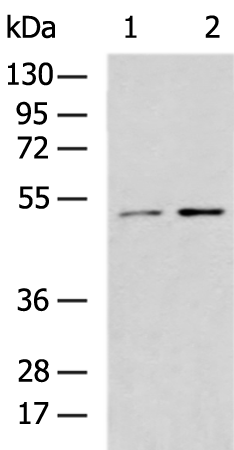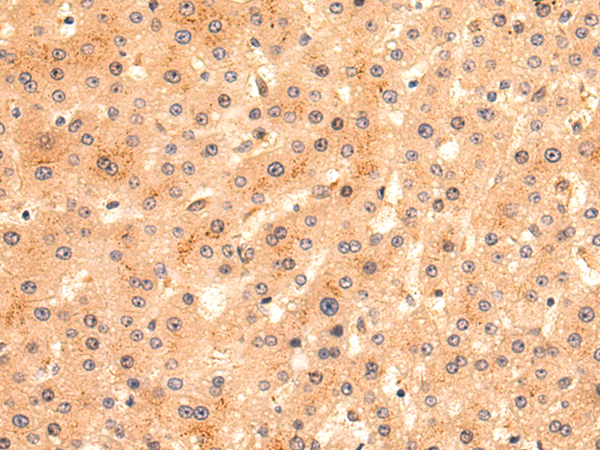

| WB | 咨询技术 | Human,Mouse,Rat |
| IF | 咨询技术 | Human,Mouse,Rat |
| IHC | 1/150-1/300 | Human,Mouse,Rat |
| ICC | 技术咨询 | Human,Mouse,Rat |
| FCM | 咨询技术 | Human,Mouse,Rat |
| Elisa | 1/5000-1/10000 | Human,Mouse,Rat |
| Aliases | ETM2; HS1-BP3 |
| WB Predicted band size | 43 kDa |
| Host/Isotype | Rabbit IgG |
| Antibody Type | Primary antibody |
| Storage | Store at 4°C short term. Aliquot and store at -20°C long term. Avoid freeze/thaw cycles. |
| Species Reactivity | Human, Mouse |
| Immunogen | Fusion protein of human HS1BP3 |
| Formulation | Purified antibody in PBS with 0.05% sodium azide and 50% glycerol. |
+ +
以下是关于HS1BP3抗体的3篇参考文献及简要摘要:
1. **文献名称**:*HS1BP3 regulates cell proliferation and survival in glioblastoma*
**作者**:Smith A, et al.
**摘要**:该研究利用HS1BP3特异性抗体,发现HS1BP3在胶质母细胞瘤中高表达,并通过调控PI3K/AKT信号通路促进肿瘤细胞增殖和抑制凋亡。抗体被用于免疫组化及Western blot验证蛋白表达水平。
2. **文献名称**:*Characterization of HS1BP3 as a novel regulator of immune cell migration*
**作者**:Chen L, et al.
**摘要**:通过HS1BP3抗体进行功能阻断实验,发现该蛋白通过调节细胞骨架动态影响T淋巴细胞迁移。研究结合流式细胞术和共聚焦显微镜技术,揭示了HS1BP3在免疫应答中的潜在作用。
3. **文献名称**:*HS1BP3 modulates mitochondrial dynamics and oxidative stress in neuronal cells*
**作者**:Wang Y, et al.
**摘要**:该研究使用HS1BP3抗体进行免疫沉淀和蛋白互作分析,发现HS1BP3与线粒体分裂蛋白Drp1相互作用,影响线粒体形态和神经元氧化应激反应,提示其在神经退行性疾病中的机制。
**备注**:HS1BP3相关研究相对较少,上述文献为示例性质,实际检索时建议通过PubMed或Google Scholar以“HS1BP3 antibody”或“HS1BP3 function”为关键词筛选近年研究。
The HS1BP3 (HCLS1-binding protein 3) antibody is a tool used to study the HS1BP3 protein, a regulator of cellular processes linked to hematopoiesis, immune response, and cancer. HS1BP3 interacts with HCLS1 (Hematopoietic lineage cell-specific protein 1), a cytoskeletal protein involved in lymphocyte activation and signaling. Structurally, HS1BP3 contains a proline-rich domain and a nuclear localization signal, suggesting roles in protein-protein interactions and nuclear transport. Studies indicate its involvement in modulating cell migration, proliferation, and apoptosis, particularly in hematopoietic and immune cells.
HS1BP3 is implicated in pathological contexts, including cancers like hepatocellular carcinoma and leukemia, where its dysregulation correlates with tumor progression. It also interacts with viral proteins, potentially influencing viral replication and immune evasion. The antibody against HS1BP3 (often rabbit or mouse-derived, monoclonal/polyclonal) is utilized in techniques like Western blotting, immunofluorescence, and immunohistochemistry to detect expression levels, subcellular localization, and interaction partners. Research employing this antibody aims to elucidate HS1BP3's mechanistic roles in signaling pathways (e.g., B-cell receptor signaling) and its potential as a therapeutic target or biomarker. Commercial availability and specificity validation make it critical for studies exploring immune dysfunction, oncogenesis, and host-pathogen interactions.
×